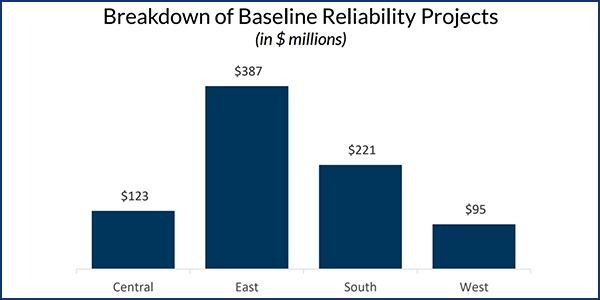By Amanda Durish Cook
MISO’s industrial and transmission customers have banded together in a new complaint against the RTO’s seven-year-old cost allocation plan for baseline reliability projects (BRPs).
The Coalition of MISO Transmission Customers (CMTC), Industrial Energy Consumers of America (IECA) and LS Power on Tuesday filed a joint complaint with FERC alleging that MISO’s current location-based cost allocation methodology for BRPs doesn’t comport with the commission’s principle that beneficiaries of transmission projects should pay for them (EL20-19).
MISO’s BRP costs are allocated only to the local transmission pricing zone where a project facility is physically located. Costs are recovered by the transmission owner developing the project.
The complainants say the BRP allocation fails to identify beneficiaries “in a manner roughly commensurate with the costs to be allocated for each project,” violating the Federal Power Act’s standard on just and reasonable rates and cost-causation principle.
“MISO’s current cost allocation methodology for baseline reliability projects concludes, without any analysis of individual projects, that for cost allocation purposes, the only relevant beneficiaries of baseline reliability projects are the ratepayers in the transmission owner zone where the baseline reliability project is physically located,” the three organizations said.
They argued that MISO should return to using a BRP cost allocation based on a line outage distribution factor (LODF) methodology, the allocation method in place prior to 2013.
“Application of a previously accepted methodology as a replacement for a methodology determined to be unjust and unreasonable is an effective way to prevent irreparable harm to ratepayers arising if the unjust and unreasonable methodology restricts the [BRPs] from competition,” they urged.
The complainants also said that use of LODF or similar analysis to identify beneficiaries would open BRPs to competitive bidding, as the projects would no longer be bound to “arbitrary cost allocation rules restricting costs to local zones.”
“Limiting the recovery of costs to only those zones where the physical assets are located grants incumbent transmission owners in MISO a federal right of first refusal — the existing transmission owners in the zone where the project is located have the exclusive right to build the [BRP] without competition from other transmission developers,” they said.
Since 2013, MISO has approved an estimated $5 billion worth of BRPs in its annual MISO Transmission Expansion Plans (MTEPs). Last year’s nearly $4 billion MTEP 19 contained 113 BRPs at a combined $826 million. MISO’s Board of Directors voted early last month to approve the transmission package. (See MISO Board OKs $4 Billion MTEP 19.)
MISO in February will release modeling on the 2019 crop of BRPs. CMTC, IECA and LS Power said those models will demonstrate whether the projects will deliver regional benefits.
“It is highly likely that the models will show that many of the 113 [BRPs] will have regional benefits such that allocation of costs based exclusively on project location would be inappropriate,” the organizations said, adding a request for fast-track processing of the complaint because of “compressed” remaining timelines in MTEP 19.
IECA President Paul Cicio said action needs to be swift to return BRPs to an allocation based on cost causation.
“In recent years, the transmission portion of our electric bills have been the single highest increased cost as compared to all other energy sources, directly impacting manufacturing competitiveness,” Cicio said in a statement. “The existing MISO cost allocation methodology fails the commission’s obligation to ensure just and reasonable rates. … By charging 100% of the costs of every [BRP] only to ratepayers in the zone in which the project is physically located, MISO is violating these basic principles and is charging some ratepayers an amount that exceeds the benefit actually received from the project while undercharging others.”
Filing of MEP Cost Allocation Plan Imminent
Meanwhile, MISO will file this week to change cost allocation for its market efficiency projects (MEPs), despite similar stakeholder complaints that the proposal ignores the wider benefits of a class of projects.
After months of back-and-forth, MISO recently landed on a cost allocation proposal that lowers the MEP voltage threshold from 345 kV to 230 kV, eliminates the current 20% postage stamp allocation and adds new benefit metrics for savings from the avoided costs for reliability projects and cost reductions related to the MISO-SPP transmission contract path.
MISO’s new plan also eliminates the regional benefit-to-cost test on local economic projects between 100 and 230 kV, now proposing to perform only a local test on those projects. The RTO had previously proposed that such projects needed to pass a 1.25:1 benefit-to-cost ratio on a regional basis, though it only proposed to allocate their costs to the local transmission pricing zone where they are located. (See MISO Makes U-turn on Cost Allocation Policy.)
Still, multiple stakeholders said the cost-causation issues that prompted FERC’s June rejection of the first cost allocation plan remain, with some saying MISO is essentially ignoring the possibility that sub-230-kV transmission projects could be beneficial on a regional basis.
Built into the plan is a commitment that MISO will revisit the method after three years to take stock of its effectiveness.





